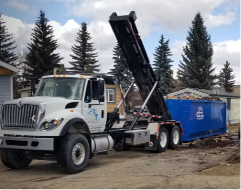Dumpster Rentals for Roofing Contractors
Roofing With Slates

Like asphalt shingles, slate comes in many colors, sizes, grades, and weights. Due to its weight – three times that of asphalt – roof rafters and roof sheathing need to be up to code to support slate’s heavy load. Slate can be placed over a layer of composition shingles only if the slope of the roof is 4-in-12 or more, and only if a structural engineer has confirmed that the roof framing can bear the weight of 7 pound per square foot.
Today, only handfuls of roofing companies specializing exclusively in slate are in business. Most roofing contractors will do occasional slate roofs. And because it is difficult to cut and apply, slate roofing is not an easy job for the do-it-yourselfers. If you do decide to do the work, expect to make a considerable investment in time and materials.
Installing Slate
Slate should be installed tilted slightly upward at the eaves, extending a half of inch beyond the rake and one inch beyond the eaves. Use a piece of lath to shim the starter course, which is made up of slates set lengthwise.
Slate is often laid on top of one layer of 30-pound roofing felt. Some contractors prefer to use individual felt strips under each course to provide additional cushioning. Two copper or brass nails, installed in predrilled holes, hold each slate. The slates are set so their beveled edges show, with about a quarter of inch gap between slates. The gaps from one course to the next should be offset by at least two inches.
To cap each side of the ridge, use slates that are the same width. Alternate the overlap at the peak from one side of the roof to the other. Slates are fastened to the ridge with two nails.
Last thing: during your reroofing projects you may generate and accumulate a significant amount of construction/renovation debris that shall be properly disposed in environmentally friendly way. If you don’t have waste removal equipment yourself you may need hiring a professional Waste Hauler for help. Consider using comprehensive online directory Dumpster Rentals Cooperative that helps to find and engage with a local Dumpster Rentals & Junk Removal business in your area, no matter where your hose is located.
For example, depending on your residence location you may consider contacting:
- Calgary Dumpster Rentals for Waste Removal & Roll Off Container Services in Calgary, AB
- Regina, SK Roll Off Bins and Dumpster Rentals for dumpster rentals and roll off services in Regina, SK
- Edmonton Dumpster Rentals will provide you with reliable waste hauling services in Edmonton, AB.
- Get in touch with Ottawa Dumpster Rentals if you need to get rid of old roof material and you are in Ottawa, ON
- Home owners and roofing contractors in Toronto, ON may contact Toronto Bins and Dumpster Rentals or Vaughan Dumpster Rentals for their waste disposal needs.
- If you are in Mississauga, ON turn to Mississauga Dumpster Rentals who can provide you with friendly dumpster rental and waste removal services at competitive price.
The waste management consultants will be able to help you to select the size of the disposal bin you need depending on the square footage of your roof.
Slate Tips
- Use solid-cooper or brass nails driven through factory-punched holes in each slate.
- Practice cutting slates on the ground – it’s safer then cutting on the roof. Always wear eye protection.
- Rent a wet saw for complicated edge cuts. This will save time and allow for accurate cuts.
- Give new slate roofs extra pitch at the eaves. Nail a quarter-of- inch-thick strip of wood along the eaves so the bottom course turns upwards slightly. This gives the roof a classic appearance and provides drip protection for the fascia.• Slate cannot be nailed over asphalt or other types of roofs and cannot be fastened with pneumatic nail guns. Slate must be nailed firmly by gently, by hand, so nailheads seat without over-stressing and cracking the slate.
- Slates with hairline cracks should be discarded; cracks only worsen with exposure to the weather.
- Published: 2011-09-14T09:41:53-07:00
- Author: ROB THIBAULT






